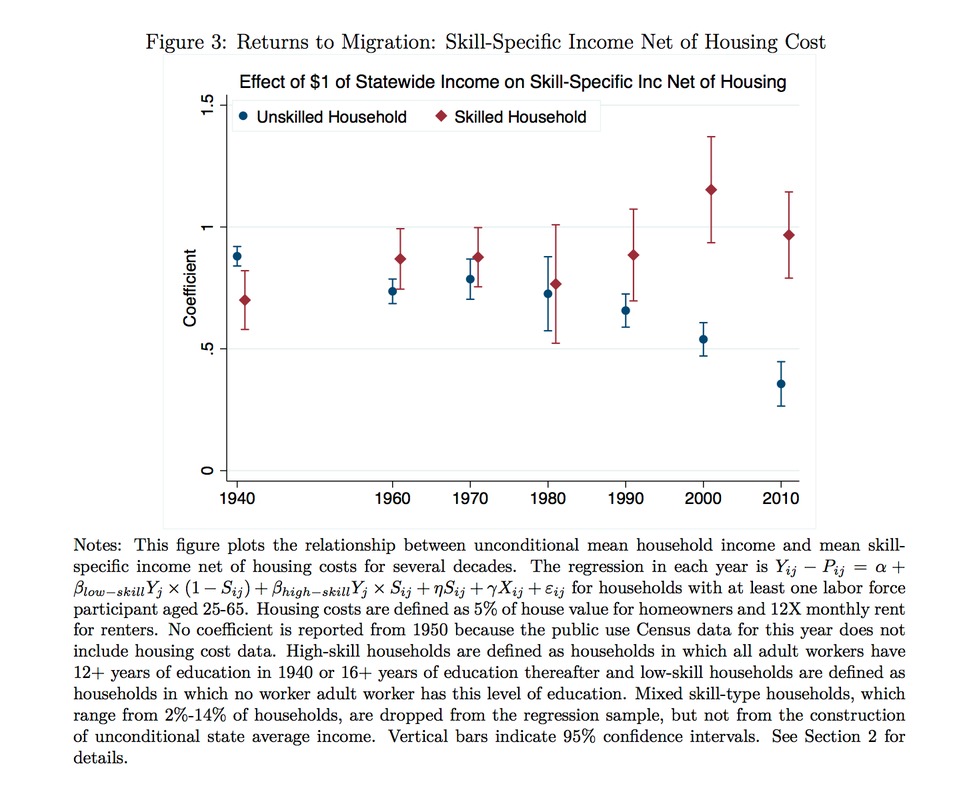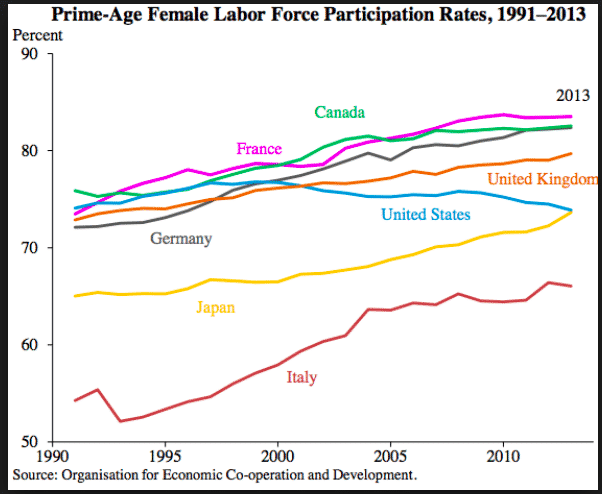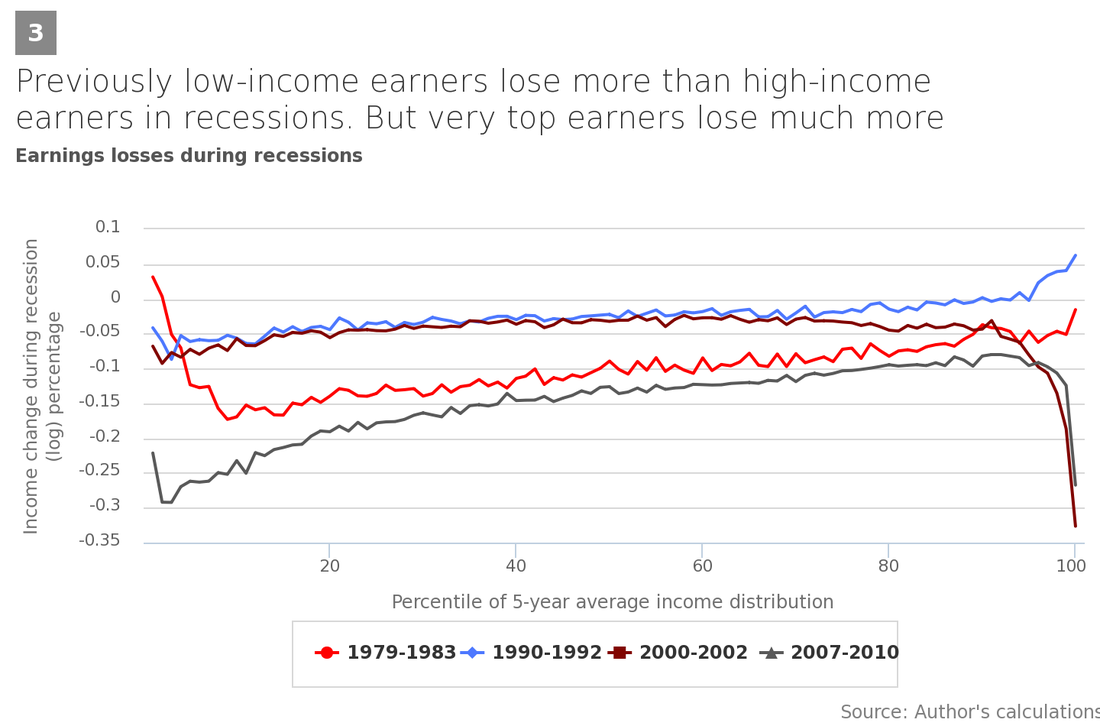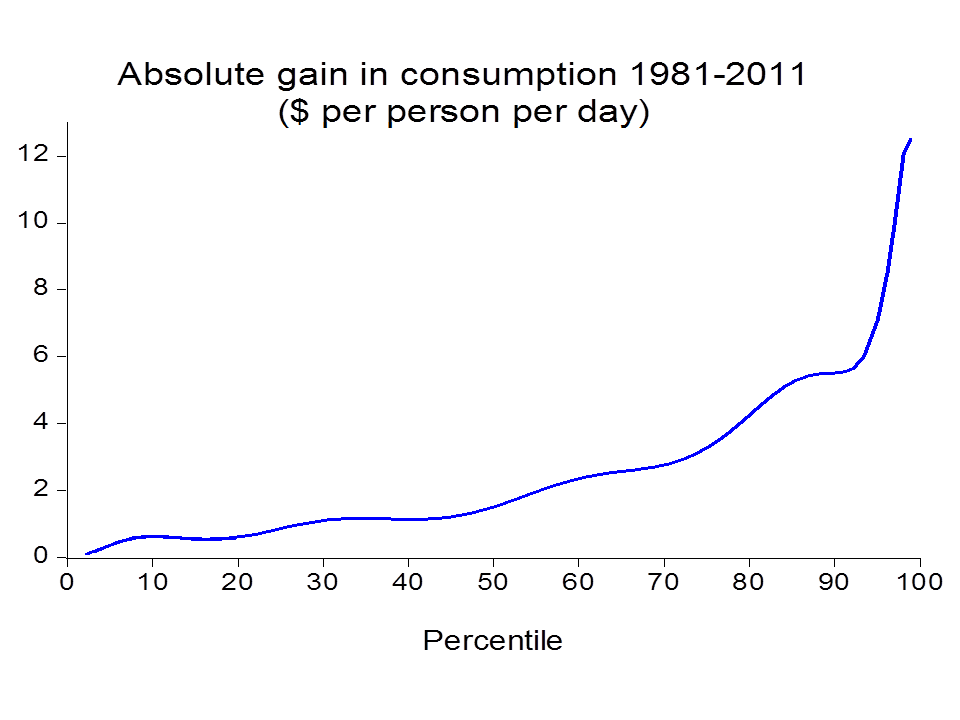|
From the new Demography issue. Ezra Fishman’s paper:
"For the 1920 birth cohort, the average dementia-free 70-year-old male had an estimated 26.9 % (SE = 3.2 %) probability of developing dementia, and the average dementia-free 70-year-old female had an estimated 34.7 % (SE = 3.7 %) probability. These estimates of risk of dementia are higher for younger, lower-mortality cohorts and are substantially higher than those found in local epidemiological studies in the United States, suggesting a widespread need to prepare for a life stage with dementia.”
0 Comments
Alan Krueger finds that "nearly half of prime age men who are not in the labor force take pain medication on a daily basis.”
Our World in Data blog: "Today, the world can produce almost three times as much cereal from a given area of land than it did in 1961.” Happy, hapless, perhaps, mishap, happen, and haphazard all come from from the same Norse root "hap" – meaning "chance”. Canada does remarkably well on Pisa: "If Canadian provinces entered Pisa tests as separate countries, three of them, Alberta, British Columbia and Quebec, would be in the top five places for science in the world … Within three years of arriving, the Pisa tests show the children of new migrants have scores as high as the rest of their schoolmates. It makes Canada one of the few countries where migrant children achieve at a level similar to their non-migrant counterparts. Another distinguishing feature is that Canada's teachers are well paid by international standards - and entry into teaching is highly selective." Taiwan’s brain drain: "To add to Taiwan’s woes, graduate salaries have stagnated. In 1999, a university graduate could expect an average monthly salary of around $900. By 2016, this had risen to just $925. “If China is growing at 6 percent a year and Taiwan is growing at 2 percent a year, which is going to be the most attractive place to go to stake out your career?”" Inside Higher Ed reports on the targeting of and threats against scholars: "Grollman and others described a common cycle of a professor’s comments on a politicized topic first appearing on a right-wing website such as Campus Reform, which is supported by the conservative Leadership Institute. It’s soon followed by other, similar websites and news outlets and, finally, Fox News. Then, they said, “ensue the death threats, the threats of sexual violence, calls for them to be fired and lose their jobs. This is not a whimsical thing -- there’s an actual system in place.” White nationalists are getting DNA tested and don’t like the results: “Specialists both inside and outside these companies [like 23andMe] recognize that the geopolitical boundaries we use now are pretty new, and so consumers may be using imprecise categories when thinking about their own genetic ancestry within the sweeping history of human migration. And users’ ancestry results can change depending on the dataset to which their genetic material is being compared — a fact which some Stormfront users said they took advantage of, uploading their data to various sites to get a more “white” result." Politico reports on voter machines and hacking: "they have no idea what happened, or [way] of knowing. I'm not suggesting votes were switched or voters were deleted from voter files, but the point is the security is so lax and so bad that they have no way of going back and doing the forensics and saying one way or the other.” And: "'Unhackable' is absurd on its face," Braun said. "If the Russians and Chinese and whoever else can get into NSA and Lockheed Martin and JP Morgan, they absolutely can get into Kalamazoo County or the state of Ohio or the [voting machine] vendor.” Occupations with the highest proportion of Blacks, Hispanics, Asians. Via Adam Tooze, prime-age female labor force participation is increasing in France, Germany, Canada, UK, but declining in US. What gives?
Jesse Shapiro at Brown talks about his research on food stamps:
"It's unusual for economics to make a quantitative prediction — economics is usually about qualitative predictions, like "when prices go up, demand falls." This is an interesting case where we have a very important public policy — the second-biggest means-tested program in the United States, recently enrolling almost one out of every five U.S. households, touching millions of lives — where economic theory says something very different from the rhetoric surrounding the program. And our data say it's not just wrong, it's not that it's 12 percent instead of 10 percent; it's 50 percent instead of 10 percent. It's wrong by a lot. ... "whereas the textbook view of the program is that out of every SNAP dollar, maybe 10 cents is going to food and the rest going to other things, we find it's more like 50 cents, which is a big difference in terms of the overall impact on households' budgets and spending behavior. We've known for a long time that people categorize money. We think that part of what's going on is that when SNAP comes in, the household sort of puts it in the food part of the budget, rather than say, "Well, let me just take some other money out of that part of the budget and spread it around evenly," the way that the economics textbook says that they should." Bart Bonikowski on white supremacy in the Harvard Gazette:
"GAZETTE: How much of this is truly organic, how much is a byproduct of social media amplification, and how much is an elaborate trolling of so-called political correctness, the kind of thing encouraged in online communities like 4chan or Reddit? Is there any way to know? BONIKOWSKI: It’s hard to know how to draw that distinction. Even if some of it is performative, it has very concrete consequences, as shown by the violence and the killing that occurred. ... So the question of how dearly they hold these views, I’m not sure that’s so relevant. In some ways, we could ask the same question about Nazis in the 1930s. How many of them really believed in the ideology, how many of them joined because their friends joined, how many of them were doing it to belong to some sort of community? All of these are interesting pathways from an academic standpoint, but at the end of the day, the movement committed unspeakable atrocities and embroiled the world in a massive war. Here too, there are many pathways toward social-movement mobilization that sociologists have documented, but what matters more in this case are the consequences." Fatih Guvenen and collaborators have a great chart, using the SSA earnings data. This is for men’s individual earnings. See the link for charts showing 1) stable volatility of one-year individual income changes, 2) income risks skew negative in recessions & positive in booms, and much more.
Glimpses into how US spying works, and intra-governmental wars, via Buzzfeed:
"Treasury Department's Office of Intelligence and Analysis has been illegally rifling through and filing away the private financial records of US citizens … Sources also claimed that OIA has opened a back door to officers from other intelligence agencies throughout the government, including the the CIA and the Defense Intelligence Agency. Officials from those agencies have been coming to work at OIA for short periods of time, sometimes for as little as a week, and thereby getting unrestricted access to information on US citizens that they otherwise could not collect without strict oversight." I’ve wondered for a while how you get agencies to care more about false positives. They have strong incentives to not end up on the front-pages (“Incompetent Agency X should've prevented bad thing Y”). That is, if they see something that might be bad - a suspected terrorist wiring money, a family that might be abusing a kid, etc. - they have a strong incentive to flag it. Agencies really want to minimize the cases where they say “this isn’t a problem” when in fact there might be a problem. In other words, they care a lot about reducing false negatives. But they have much weaker incentives to care about false positives. Cases where they flag a potential problem, some action is taken, and it turned out that everything was fine. The costs are diffuse. I find this particularly worrisome with respect to privacy. If you posit a) tribal politics that impede the emergence of social consensus driving legislation to protect privacy, and b) that our future revolves around a data-driven service economy, the equilibrium is basically a panopticon. Martin Ravaillon: The graph shows the mean gain in consumption in the developing world as a whole over 1981-2011 by percentile from the poorest (p=1) to the richest (p=100). “Not only have the absolute gains been greater for the better off, the gains were nearly zero at the very bottom of the distribution for the developing world as a whole."
Megan McArdle: "Some studies suggest that voucher programs do modest good; others suggest that they do very little; and a few suggest that the impacts are actually negative. My overall takeaway from the literature is that voucher programs probably do a little bit of good. But the emphasis is on the word "little"; they are not a cure-all, or even much of a cure for anything. It was reasonable to think, in 1997, that voucher programs could change the world. Now we have two decades of evidence.” She points to peer effects, rather than school quality, driving parental choice (see this new NBER paper). "Perhaps it doesn't make much difference what we do in the schools, because most educational effects are driven by a combination of genetics and home environment."
"There’s no value in free college if the colleges lack the resources to educate students. It’s like giving K-12 students vouchers when there are no decent private schools available to to them.” ... "We’ve had an enormous increase in federal financial aid for low-income students, and completion rates are relatively stagnant. Big-picture, something is not working" … "the authors found that spending to improve instruction and academic support has a large positive impact on student enrollment and degree completion." Link. From the UK, on Voxeu.org: "since the move from a free higher education system to a high-fee, high-aid system, university enrollment has increased substantially, with students from the poorest backgrounds experiencing the fastest increases in participation. Moreover, university funding per head has recovered dramatically since the introduction of fees." Andrew Dowling, Senior Lecturer in Catalan History at Cardiff, writes:
"the desire for independence is a relatively late development. Until the late 1930s and the onset of Civil War, the Catalan labour movement – which has always been especially strong in Catalonia because of the region's industrialisation – was unique in Europe because of its attachment to anarcho-syndicalism. No city in human history has ever experienced the dominance of anarchism as much as Barcelona. The anarchist movement, unlike Leninist-Marxism, never sought to create an ideology sympathetic to nationalism and remained highly committed to internationalism. The pro-independence movement, therefore, was unable to obtain either the support of the labour movement or the bourgeoisie. As such, the movement for independence was fragmented and weak and continued to be so well into the 1970s. ... "Today, the struggle for Catalan independence can be considered a middle class revolt. Middle class radicalism rarely occurs, but it is most likely to manifest at times of political alienation. This is exactly what has happened in Catalan society over the course of the 2000s. ... Both before the economic crisis and since, middle-class sectors in Catalan society have seen the erosion of their elevated position as a rich region of Spain. This has challenged the self-perception of middle-class Catalans. With the arrival of the economic crisis in 2008, Catalans became greatly discontented at the financial contribution they made to Madrid, while businesses closed and employment opportunities dwindled. These economic grievances have led to the intensification of alienation from Spain." Ivan Rogers lectures at Oxford, lots of interesting bits:
“The political effect of the decision of May 2004 to allow free movement of people into the UK from those [Eastern European] states without the seven year transitional period for which their Accession Treaties provided, of which all the other major western Member States took advantage, was even more critical. … The official internal forecasts we saw of the potential numbers of arrivals were, as one looks back, just laughably low. ... "Cameron's own crucial decision to take the Tories out of the European People's Party (EPP) Group, and to set up a new Group, the European Conservatives and Reformists (ECR) enthused his parliamentary party. It helped win him the party leadership. He did it because, ultimately, he did not subscribe to the core political goals of the EPP for the EU. But it undoubtedly lessened the Conservatives' influence inside the belly of the beast, in which the backroom deals and manoeuvres of the three "mainstream" Grand Coalition parties largely dictated key appointments and institutional positions on key policy issues. ... "the mutual misreadings of interests and incentives which we saw in the renegotiation, and we are seeing in even starker form now, stem from the absence of systematic informal political level contacts which build understanding. Not many Tories now intuitively understand Christian Democrats in the way they did 20 years ago. The same is true in reverse." |
AboutThis is my notepad. Archives
January 2018
|




 RSS Feed
RSS Feed
